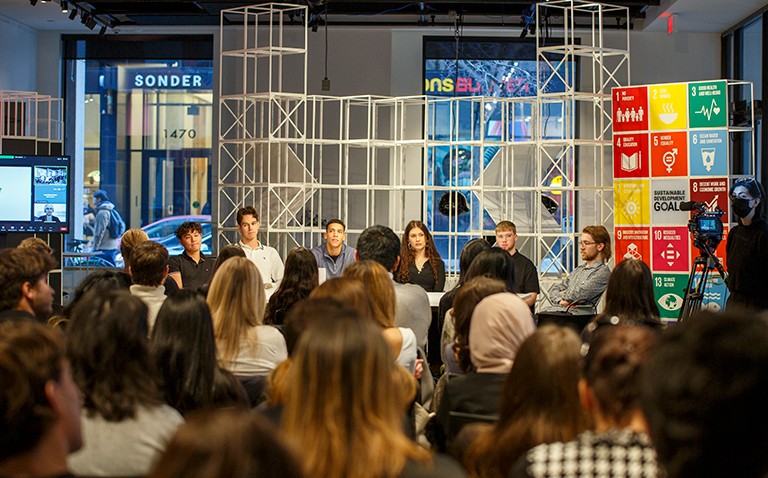John Molson School students investigate what motivates consumers to buy sustainably — or not

In the face of the climate crisis, consumers are experiencing increased pressure to buy sustainably. Products that end up in landfills release methane gas as they decay, adding to greenhouse gas emissions.
Students in Concordia’s John Molson School of Business investigated what motivates consumers to go green in a course offered by the Department of Marketing, MARK 305: Consumer Behaviour. The students then presented their research over four days in November at Concordia’s 4TH SPACE.
Darlene Walsh, chair of the Department of Marketing, worked with marketing lecturers Shaun Lynch and Richard Sejean to build in an experiential learning component by taking the final presentations out of the classroom and into 4TH SPACE.
“The project goal was to get students to think about real-world sustainability challenges and recommend impactful strategies based on consumer research,” says Sejean, who taught the course.
Students teamed up to select one of the United Nations’ Sustainable Development Goals (SDGs) around which to focus their research questions. The UN developed the 17 goals to ensure prosperity while advocating for a sustainable path forward.
Thirty-five teams from each section of MARK 305 presented their findings. Following their presentations, students took questions from an audience of their peers and an industry judge.

Over the four days, the judges included Zoë Goodman, marketing manager at Metso; Marjaneh Ansari, senior marketing manager at L’Oreal Canada; Jarred Ryan Pellat, senior manager of public relations and communications at Genesis Motor North America; and Marc Bishai, a lawyer with the Centre québécois du droit de l’environnement.
Tom Sassen, a first-year marketing and finance student, tackled SDG 12: Sustainable Consumption and Production with his teammates. The team developed a survey to understand how likely consumers are to participate in a lateral recycling program offered by a prominent clothing brand.
These programs divert products from landfills by repurposing, reselling or otherwise reusing them.
“We were surprised that many of the participants were open to using a secondary market service offered by a clothing brand that would provide store credit,” Sassen reports. “It was also nice to see how environmentally conscious our generation is and how they care about our future.”
Second-year marketing student Samantha Sarazen’s team chose SDG 5: Gender Equality, focussing on the “pink tax.” The term refers to the gender-based price disparity in which products marketed toward women are more expensive than the same products marketed toward men.
The team surveyed women about this issue and found that 45 per cent of respondents weren’t familiar with the concept.
“Understanding the pink tax is so important for promoting gender equality. Gender-based price disparity not only perpetuates financial inequality but also reinforces harmful gender stereotypes,” says Sarazen.
“It was empowering to speak to the crowd and be confident in my knowledge and research,” she says of the final presentation at 4TH SPACE.
Marc Bishai attended as a judge on the last day of presentations.
“I was impressed by the quality of the presentations and the level of the students’ engagement,” he says. “With their rigour, these students have everything they need to rewrite the future.”
See a selection of the final presentations from MARK 305.
Learn more about the Department of Marketing at Concordia’s John Molson School of Business.


